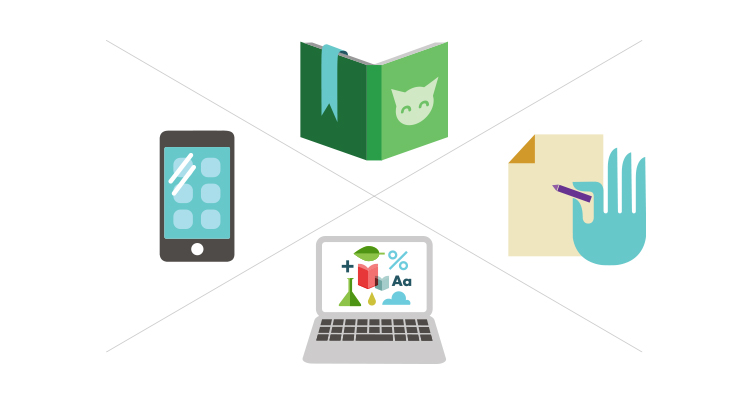Six year old Zoe was frustrated with school. Already reading at a fifth grade level in the first grade, Zoe was regularly finished with her work well before the rest of her class. Rather than continue learning, she was told to color on the back of her worksheets until the rest of her class caught up. Despite her mom, Jennifer’s, frequent requests to her teacher that something be done, and offers to send supplemental work for her, nothing changed.
Though she’d only just begun her education, Zoe started each school day filled with dread, and ended it in tears. Zoe is an advanced learner, and unfortunately her experience in school is one that is all too common among gifted children.
Faced with the prospect of her bright, inquisitive daughter losing her passion for learning, Jennifer, took action. She enrolled Zoe in Escambia Virtual Academy, her local K12 online school, and as she shares in our interview, the change has been remarkable.
What was school like for Zoe before you came to K12?
She was bored and unchallenged by the work but because she was quiet and well-behaved she didn’t get into trouble or express her unhappiness in class. At home, she would say she hated school because it was “baby-ish” and cry in the morning because she didn’t want to go. She didn’t like having to wait for the other students to finish their work before they could move on to the next activity so she was very frustrated.
What was that experience like, for you as a parent, seeing your child so frustrated?
I kept many of her drawings and worksheets from Kindergarten and I noticed that in first grade the majority of her worksheets had drawings on the back because that was what she was instructed to do while waiting. One of them said “Dear Mom, when I’m at school I feel like I’m in a maze.” I felt saddened and powerless. I looked into several options that didn’t work out because of timing or finances and wasn’t sure what I could do before I found K12.
What changes did you see in Zoe after coming to K12?
Zoe blossomed. Her personality really came through in an environment where she felt comfortable. Her sense of humor, creativity and inquisitive nature are encouraged in our home. She seemed happier because she could go at her own pace and had more autonomy. She chooses the order and in certain subjects she navigates the lesson and takes the assessment on her own.
In the last two years she has developed issues with hyperactivity and attention deficit so homeschooling gives me the ability to completely tailor her learning environment to focus on her strengths while accommodating in areas where she struggles. We break it down into blocks and allow her to choose her workspace; desk, floor, hammock, patio, etc. She can take breaks to do something physical in between and because she has little distraction, she finishes quickly and can spend more time exploring her interests.
You mentioned in your story that Zoe’s favorite subject is paleontology–how does online schooling allow her to pursue her interests, especially those that are more unique or advanced for her age?
Any time a subject piques her interest, she writes down a few notes and after her daily tasks are complete she researches the topic. I like that some of her lessons have suggestions for further reading, optional activity suggestions, or the freedom to choose a topic, as in writing skills.
For her research report, she wasn’t limited to just books from the curriculum so she chose a couple of children’s reference books on dinosaurs from her own library and then supplemented with college texts to expand on the information. In a traditional school setting, the teacher must ensure all students complete the required tasks and there is no extra time to explore in-depth. K12 affords us that opportunity.
What are Zoe’s strongest subjects? Are there any areas she struggles in? How has online school helped in these areas?
Her language arts skills are the strongest but her ability to grasp concepts quickly make any subject fairly easy to learn. Math is her least favorite so I like that the online format makes it interactive to engage her and keep her interested, there are hands-on supplemental tools, and the material is presented in a practical rather than purely conceptual way.
What is Zoe’s favorite thing about online school in general? What would you say is yours?
According to Zoe, her favorite thing is doing school in her pajamas and not having to sit down and be quiet all day and feel bored. My favorite part is feeling like I’m giving my child an educational experience that was not an option for me, where she can explore her academic potential, enjoy her learning activities, and truly be herself without feeling stifled or under-stimulated.
We hear a lot of questions about socializing from parents considering online school. How do you encourage Zoe’s social development?
Zoe attends an after-school program in our community where she has made friends and gets a chance to just enjoy playing with other kids. Next year she wants to study martial arts so that will be another chance for her to meet new kids and spend time away from us.
You mentioned in your story that you’re a full-time working mom. We often hear from working parents considering online school for their kids who wonder how they can do both. How do you manage Zoe’s schooling and your work schedule?
When we first started, my husband and I had to shift our schedules around so that we were taking turns with her. For us, we made the decision to commit to this and just make it work. He is a student and does freelance digital media work while I left my 9-5 job for a more flexible position as a counselor in a private practice. We utilize after-school care to the fullest. I completely understand that many single parents or parents with inflexible jobs don’t have that option. For them I would suggest seeking or starting a homeschool co-op with a few other families so they could take turns and try to fit their work schedules around that.
Any advice for other learning coaches with gifted children? Are there any particular challenges or things to consider in coaching an advanced child?
I would encourage parents to take the refresher courses if needed. You can also look ahead on the schedule to ensure you are familiar with the material you are presenting. Be flexible and creative; teach beyond the material. For example, if your child is learning about reptiles, explore evolution and geologic timelines. Make it challenging. I have Zoe answer questions first and only provide multiple choices if needed. If a worksheet is too easy, don’t force them to do “busy work”, have them write, create or present something based on the topic. Ask questions to stretch your child’s intellect. Asking them why they think something is the way it is, or how it became that way encourages deductive reasoning.
Advanced learners can become lazy because things come more easily to them. When they ask a question, ask them “well, what do you think” and give them a chance to work it out first. Finally, don’t be afraid to ask for help or ideas from their K12 teacher. Often they can provide resources, links, and suggestions to make your child’s learning experience a positive one.
Is your child an advanced learner? Visit The Flipped Switch, K12’s new Faceboook community for gifted children and their families.
To learn more about Zoe and her family, and read the stories of other families, visit What’s Your Story.
Have your own story to share about how K12 and online learning has changed your family’s life? We’d love to hear it!






















































































































